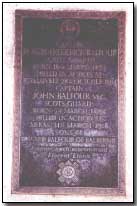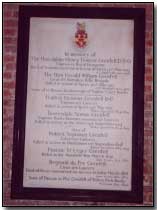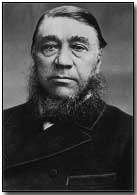Feature Articles - The Most Popular War in History - The Souls
 'The Souls' - and the
Children of the Souls
'The Souls' - and the
Children of the Souls
'The Souls' is an informal label (origin obscure) for a group of upper and upper middle-class families who formed an important part of the political and intellectual elite of Britain from the mid-19th century until the Great War.
Through their education and social position they and their children were able to combine the practice of the chivalric ideal with knowledge of Classical civilisation as a preparation for life. During the War these families suffered badly, and never really recovered. They included amongst others two of the country's premier political families (the Balfours and, by marriage, the Asquiths), both of whom suffered badly in the Great War.
Others in this group included the Grenfells commemorated above, the Tennants (a wealthy commercial family from Glasgow who married into the Asquiths), the headmaster of Eton from 1905-1916 Edward Lyttelton (connected to the Tennants) and the Horner family of Mells, near Frome in Somerset.
My father also makes brief reference to other groups of connected families - for instance the Churchills who were connected to the Dukes of Richmond, the Spencers (the late Princess of Wales' family) and the Villiers family. Another example he quotes is the more openly intellectual aristocracy - a group comprising Darwins (Origin of Species), Huxleys (Thomas Huxley was Darwin's most ferocious advocate, and ancestor of Aldous Huxley of Brave New World fame), the Arnolds (Thomas Arnold of Rugby and his son Matthew), and more.
One of the Horner ancestors is probably the Horner of 'Little Jack Horner' fame. Mells itself is a beautiful village set in a steep, almost enclosed valley, with a church and churchyard which is almost a miniature shrine to the idealism of the Great War. Inside the church is an elaborate memorial to an Edward Horner, whose obituary begins: 'He was greatly loved in his home at Mells, but with eager valour he left his heritage at the outbreak of war to fight in France...'. It ends, 'Thus in the morning of his youth he hastened to rejoin his friends and comrades by a swift and noble death.' The churchyard contains the graves of Siegfried Sassoon, Lady Violet Bonham-Carter (maiden name Asquith) and others.
 'The
Souls' were amongst those who introduced a more intellectual strain into
upper-class life and were therefore able to take full advantage of the
higher reaches of classical learning, for instance the ancient Greek
philosophers such as
Plato
and Aristotle.
'The
Souls' were amongst those who introduced a more intellectual strain into
upper-class life and were therefore able to take full advantage of the
higher reaches of classical learning, for instance the ancient Greek
philosophers such as
Plato
and Aristotle.
This was particularly the case at Balliol College in Oxford, which thanks to the continuing influence of the formidable Master Benjamin Jowett had an established reputation for teaching and scholarship.
Jowett himself took teaching very seriously and according to Jeanne MacKenzie seems to have felt a vocation to train Britain's ruling elite for public life via study of the Classics wherein he felt discussion of all important aspects of being human could be found. He popularised ancient Greek culture and produced a number or defining translations of ancient authors of whom the arch-idealist Plato seems to have been his favourite. Although he died in post in 1893, his influence continued to be felt during the period up to 1914, and probably for some time afterwards.
A number of those connected with 'The Souls' and who served in the Great War also attended Eton College during Edmond Warre's headship (and immediately after), whose system and ethos Jeanne MacKenzie describes in some detail. As in many other public schools, learning centred on the Classics, but there was also (distilled from the games cult) a creed of so-called 'Muscular Christianity' promoting 'the code of courage, truthfulness and honour, expressed through sport'. (The Children of the Souls, p32).
Edmond Warre's predecessor had gone so far as to arrange for a Pre-Raphaelite picture of Sir Galahad to be hung in the Chapel, so that the boys could meditate on a model of 'pure knighthood'. Whilst this was not dissimilar to the ideas and moral codes found in other public schools, it fell to Eton College to educate many of the country's leading figures and thus to exert an influence disproportionate to its size.
Eton and Oxford combined sowed in many of these young men a life-long idealism and sense of duty, and even at University their ideals led some of them to become caught up, somewhat quixotically, with a number of altruistic causes including the emerging Labour movement. Particularly interesting was Patrick Shaw Stewart who was especially fond of the Classics whilst at Eton, and who had this to say on war whilst still an undergraduate:
[War gave the volunteer] '...the opportunity for the most splendid self-sacrifice that it commonly falls to the lot of mankind to make. To the nation at large it is practically the only influence which can shake the average citizen out of his self-absorbed tranquillity... It is the contingent possibility of a state of war that renders the intervals of peace no less salutary to the nation... that fosters the national spirit, the spirit of independence, the spirit of competition which is the animant spirit of the human race.'
 Stewart
also regretted that England frequently had no worthier opponents than
tribesmen or the Boers (although he perhaps did the Boers an injustice, see
photograph and caption). The general tone of his sentiments is very
much that which would drive men to battle in 1914.
Stewart
also regretted that England frequently had no worthier opponents than
tribesmen or the Boers (although he perhaps did the Boers an injustice, see
photograph and caption). The general tone of his sentiments is very
much that which would drive men to battle in 1914.
When war came, some of the more boyish idealism was inevitably changed, and the effect on the families back in England, particularly when two or three or even more sons were killed was catastrophic. However the way in which some of them died does sum up much of the attitude which attracted so many to the front in 1914 and even 1915 when disillusioning reality was beginning to make itself felt. Here is a comment on the death of 'Billy' Desborough (one of the Children of the Souls chronicled by Jeanne MacKenzie) by his commanding officer during Second Ypres (July 1915):
'He was killed yesterday afternoon about 3pm when gallantly charging over the open at the head of his men... I've just marched into billets with a casualty list of 19 officers and one's only inclination is to sit and sob. I can't grasp the magnitude of the loss.'
This image of a young officer, often public-school educated and always leading from the front to charge entrenched positions protected by machine guns and Krupps-manufactured heavy artillery, was one which would be repeated only too often. The children of 'The Souls', well-born, idealistic and educated at Eton and Oxford, were in many ways the epitome of this type.
Appendix - The Village of Mells in East Somerset (and a School Chapel Open to the Public)
Like Eton College this place is well worth a visit should you happen to be in the area. I suggest using a large-scale (1:50 000) map to find it as it's in amongst a network of very minor roads 3 or 4 miles west of Frome. It is also near Downside at Stratton-on-the-Fosse, a public school whose magnificent Abbey Church is usually accessible to the public and contains a handsome roll of honour to the fallen in the Great War.
On approaching Mells you descend a fairly steep-sided valley to find the village itself at the bottom with a stream running through it. It is truly an idyllic spot, which might well have been the inspiration, or at least the fertile background, for the high-minded sentiment described in this article and elsewhere.
The Horner family house and the church are slightly up from the stream. Unfortunately public access to the manor is as far as I know not possible but it can be glimpsed from the road. It is easy enough to get into the church, certainly on Sunday afternoon (and even if the church is closed you can still inspect the graveyard). The memorial to Edward Horner is very elaborate, containing the obituary mentioned above and a statue in bronze of Edward on a horse.
There is also a pub on the main street near the turning off to the church, which will serve you a good lunch in atmospheric surroundings, including a sheltered courtyard if the weather is warm. Some of the building dates back to Tudor times.
If you look in on Downside, the 'Somerset Wagon' at Chilcompton is recommended, and to find out more about the Abbey Church and the School, click here.
Bibliography:
1. MacKenzie Jeanne (1986) The Children of the Souls, Chatto and Windus, 40 William IV St., London WC2N 4DF
2. Reader W J (1988) At Duty's Call - A Study in Obsolete Patriotism, Manchester University Press
Picture Credits:
1. Photographs of memorial tablets in the Cloisters at Eton College are reproduced by the kind permission of the Provost and Fellows
2. Picture of Paul Johannes Kruger is reproduced from: The British Empire, Daily Telegraph Group Ltd., 1 Canada Square, Canary Wharf, London E14 5DT
Click here to view the main article
Article and photographs contributed by Humphrey Reader.
A 'Wibble-Wobble' was slang for tanks.
- Did you know?
